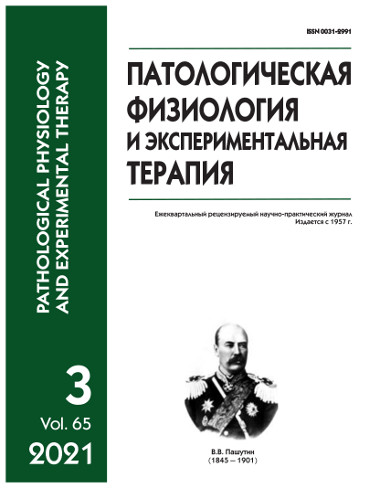Effect of adaptation to intermittent hypoxia on serotonin metabolism and oxidative stress in the hippocampus of rats with experimental post-traumatic stress disorder
Abstract
Background. Post-traumatic stress disorder (PTSD) develops long after a mental traumatic event. In patients with PTSD, low serotonin levels often combine with oxidative stress-induced inflammation. Searching for effective non-pharmacological therapies for PTSD is important. Adaptation to intermittent hypoxia (AIH) is one of highly effective and widely used methods. The aim of this study was to elucidate the effect of AIH on serotonin metabolism and oxidative stress in the hippocampus of rats with PTSD. Methods. The study was performed on 34 sexually mature male Wistar rats divided into 4 groups: control, PTSD, AIH, and PTSD+AIH. Experimental PTSD was modeled with chronic predator stress, where animals were exposed to predator smell (cat urine) for 10 days, 10 min daily. Then rats were conditioned in a hypobaric altitude chamber for 14 days at a 1,000-m simulated altitude for 30 min on day 1 with altitude and duration progressively increasing to 4,000 m for 4 h on day 5 and all the remaining days. Behavioral reactions of rats were studied with the elevated plus maze (EPM) test. Concentrations of serotonin and the serotonin metabolite, 5-hydroxy indole acetic acid (5-HIAA), were measured by high-performance liquid chromatography. Contents of primary and secondary lipid peroxidation (LPO) products were measured spectrophotometrically according to the method of I.A. Volchegorskiy et al. The oxidative damage to proteins was assessed by the content of carbonylated proteins. Results. The EPM test showed that 14 days after the predator stress completion, the anxiety level was higher than in control, and this effect was alleviated by AIH. Also, stress-exposed rats had lower serotonin and higher 5-HIAA concentrations, which resulted in a significantly higher serotonin metabolic index compared to the control. The course of AIH did not cause any significant changes in concentrations of serotonin and its metabolite as compared to the control. In the PTSD + AIH group compared to the PTSD group, the serotonin concentration was increased whereas the 5-HIAA concentration and the metabolic serotonin index were decreased. Studying oxidative stress in the hippocampus of rats with the PTSD-like condition showed that both the basal level of carbonylated proteins and the content of LPO secondary products were increased compared to the control group. Conclusions. In experimental PTSD in the hippocampus, the decrease in serotonin content was associated with the increase in its metabolism and with potentiation of oxidative stress. The neuroprotective effect of AIH was evident as alleviation of oxidative stress in the hippocampus.






